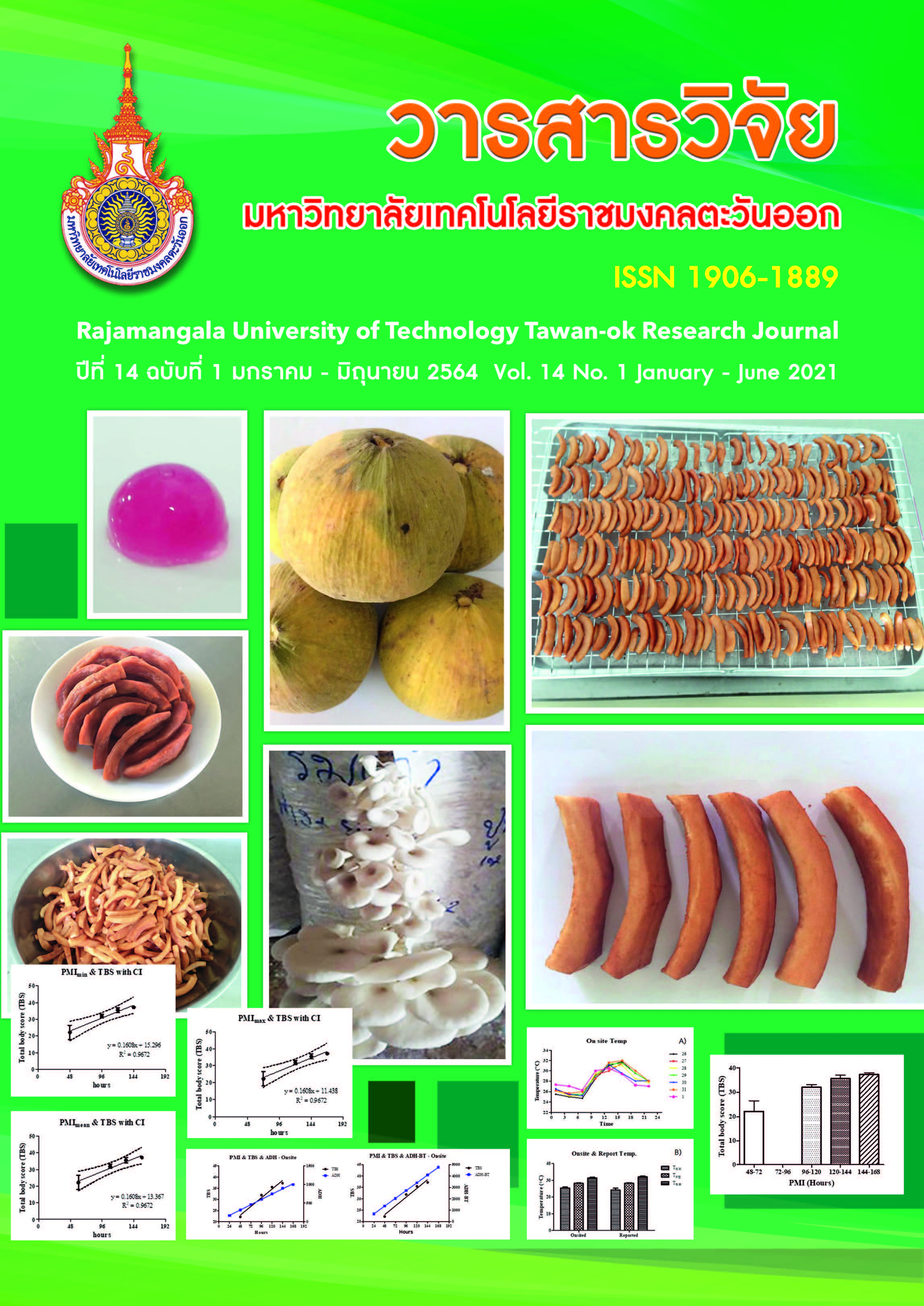อัตราอุบัติการณ์สารกลุ่มเตตราซัยคลินตกค้างในกุ้งเขตพื้นที่จังหวัดมหาสารคาม
Main Article Content
บทคัดย่อ
การเพาะเลี้ยงกุ้งส่วนใหญ่ใช้ยาปฏิชีวนะออกซีเตตราซัยคลินเพื่อรักษาโรค จึงทำให้มีสารดังกล่าวตกค้างในกุ้ง เมื่อผู้บริโภครับประทานสะสมเป็นระยะเวลานานอาจเกิดอาการดื้อยา เกิดอาการผิดของระบบทางเดินอาหาร พิษต่อตับและไต เก็บตัวอย่างกุ้งตามพื้นที่จำหน่ายกุ้งในจังหวัดมหาสารคามทั้งหมด 50 ตัวอย่าง จาก 43 ร้านค้า วันที่ 13 ถึง 14 ตุลาคม 2563 จากการทดลอง พบว่า สถานที่ตรวจไม่พบยาปฏิชีวนะ คือ ตลาดสด อำเภอนาดูน คิดเป็นร้อยละ 2 สถานที่ตรวจพบออกซีเตตราซัยคลินมี 49 สถานที่ คิดเป็นร้อยละ 98 สถานที่ที่มีปริมาณสารออกซีเตตราซัยคลินในระดับปลอดภัย คือ ตลาดสด พบ 10 สถานที่ คิดเป็นร้อยละ 20 ห้างสรรพสินค้า พบ 2 สถานที่ คิดเป็นร้อยละ 4 และ ร้านอาหาร พบ 1 สถานที่ คิดเป็นร้อยละ 2 ตามเกณฑ์มาตรฐานสำนักงานคณะกรรมการอาหารและยาแห่งประเทศสหรัฐอเมริกา (USFDA) และคณะกรรมาธิการมาตรฐานอาหารระหว่างประเทศ Codex Alimentarius Commission(Codex)
Article Details
เอกสารอ้างอิง
Aekpanithan, U., W. Krajaywong and S. Poonyarattapalin. 1995. Residues of Oxytetracycline in Peneaus monodon. and silt form farm another size in Songkha Province. 1995. Academic paper 18 August 1999. Institutes of Fisheries, Songkha (In thai)
Chalermchaikit, T., S. Dilokkiat, S. Srisagha and N. Lertworapreecha. 2005. Residues of Oxytetracycline, Sulfamethoxazole, Sulfamethoxazole+ Trimethoprim and Enrofloxacin after withdrawal time in white shrimp (Penaeus vannamei) detected by Microbial Inhibition Disc Assay versus Screening Test Kit “SAM-TEST”. Songklanakarin J. Sci. Technol., 2005. : (283-290). (In thai)
Imsomboon, T. 2019. Unit 4 Surveillance of health behavior. Hand out subject of Health promotion, assessment and primary care. Nonthaburi : Sukhothaithammathirat. (In thai)
Jaiyen, A., 1992. Study of distribution of Oxytetracycline in Peneaus monodon. M.Sc. Kasetsart university. Bangkok. (In thai)
Nimrat, S. and W. Woottipunchai. 2009. Aquaculture sustainable : role of Microbiology and application. 1st ed. Bangkok : Active print. (In thai)
Punpaeng, T. 2019. Unit 4 Toxicology. Hand out subject of Fundamental of Occupational Health and Environmental Health. Nonthaburi : Sukhothithammathirat (In thai)
Raksincharoensak, P. 1992. Residual and result of Oxytetracycline Antibiotic per growth and disease in Peneaus monodon. M.Sc. Thesis. Kasetsart University, Bangkok. (In thai)
RojjanarakPharm. n.d. Antibiotic test manual. Brochure. Bangkok: RojjanarakPharm (In thai) Saengwiroon, p. and S. Vitchaiwootthivong. 2005. Analysis of Tetracycline groups residual in freezing shrimp export. Medical science bulletin. 47[2] : 95-105 (In thai)
Thepparat, Y. 2005. Pharmacokinetics and bio-useful of Oxytetracycline in Litopenaeus vannamei. M.sc. Thesis. Prince of Songkla University, Songkla. (In thai)
Tokitsana, R., K. Kulladirok, K. Boonchoovong, B. Kongchon and T. Mawongwai. 2015. Aquaculture Thai conditions in ASEAN economic community. 1st ed. Bangkok: Ceno publishing and packaging. (In thai)
Toomsungthong, N. 2009. Determinant of Improvement amount Tetracycline and derivative test state in shrimp by high performance liquid-chromatography. M.Sc. Thesis. King Mongkut’s Institute of Technology Ladkrabang, Bangkok (In thai)
Watthanasin, S., 2006. Food Microbiology. 2nd ed. Bangkok: Thammasart University. (In thai)


